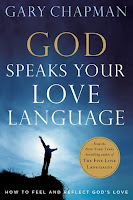 |
| (Amazon UK link) |
Someone whose love language is Words of Affirmation may express love verbally, but if their loved one only really ‘speaks Acts of Service they may feel that the words are meaningless. And vice versa, of course. Learning to use one’s non-preferred love languages can enrich any relationship, particularly if one is aware of the one that is most used by their partner or relative.
I was intrigued when I came across the book ‘God Speaks your Love Language’, which I read towards the end of 2009. At the time I was pretty sure I knew my two preferred love languages, and when I read the book it seemed to fit. But I know how easy it is to make theories and articles ‘fit’ - and recently I’ve been wondering whether I was right, or indeed whether one’s preferred love language might change over the years.
So I decided to re-read the book with an open mind - and with my own rather vague theory that we don’t necessarily use the same love language with everybody. Someone who is a ‘good hugger’, for instance, may appear to be speaking the ‘Physical Touch language - but if it’s offered to everyone, is it really an expression of love, or more an expression of culture, upbringing and personal preference? I wondered if we have ‘like languages’ and also began to wonder if the way we speak to (and hear from) God might be different from the love language we speak to our partners and relatives.
The book is well laid out, starting with a general overview of the love language theory - and it’s not necessary to know one’s own, or to know much about the theory. Then the author takes one love language at a time and devotes a whole chapter to each one, explaining how God uses different ways of communicating, and how different people express their love for God.
Some are obvious: words of songs or liturgy or spoken prayers fit with words of affirmation, physical sensations and movement fit with physical touch, serving in various roles fit with acts of service, a focus more on personal devotions and ‘quiet times’ fits with quality time, and of course the giving of money, practical gifts and time fit with the love language of gifts.
To some extent, they all resonated with me. I believe they are all important as different ways to relate to God, and to others within the Body of Christ. And yet, at the same time, I didn’t feel that any of them fit me fully, or even reasonably well. It was good to be reminded of the different - and equally valid - ways of expressing love to God and those around us, and the importance of ‘listening’ to love expressed by God and by other people in ways that we might not naturally hear.
But I don’t feel any closer to knowing what my preferred love language might be. I’m pretty sure it’s not gifts or acts of service, even though I think both are important.
In the last two chapters the author writes about love in general, and preaches quite a strong sermon about God’s love and the need to accept it, and acknowledge it, and turn our lives to Jesus. So this is a book for those in - or on the fringe of - the church; since the focus is on hearing from and speaking to God in a variety of ways, it’s rather obviously not intended for atheists or agnostics.
The writing is good, peppered with plenty of interesting anecdotes as well as Scripture quotations and references to other authors. On the whole, though I'm not sure I learned anything new, I’m glad I re-read it. Recommended to anyone wondering how spirituality and love languages work together, or who would like to explore different ways of communicating with God.
Review copyright 2022 Sue's Book Reviews
No comments:
Post a Comment